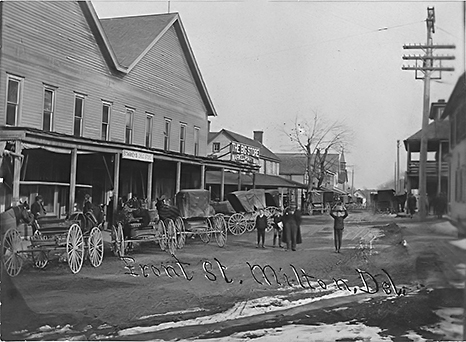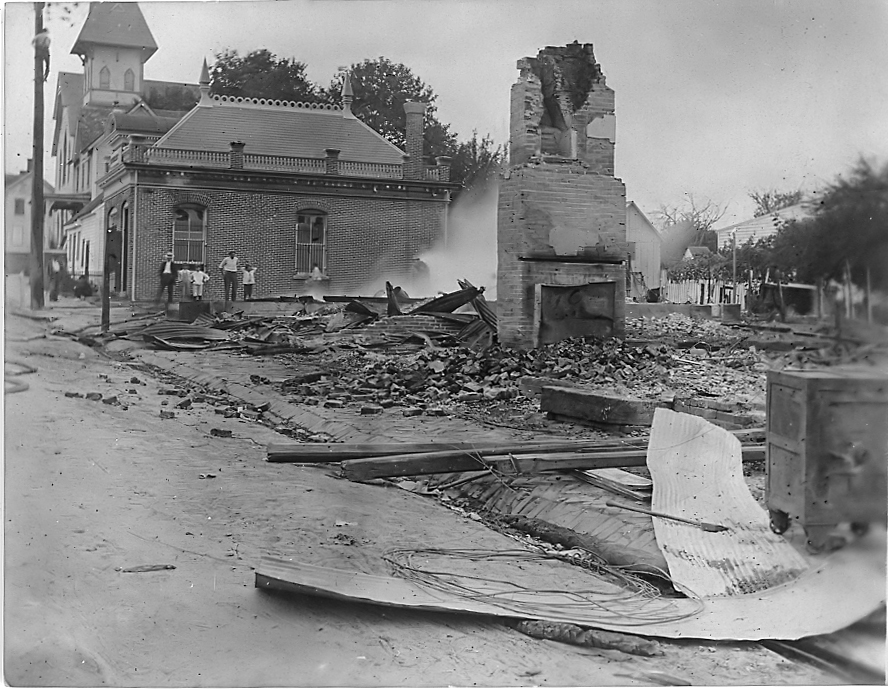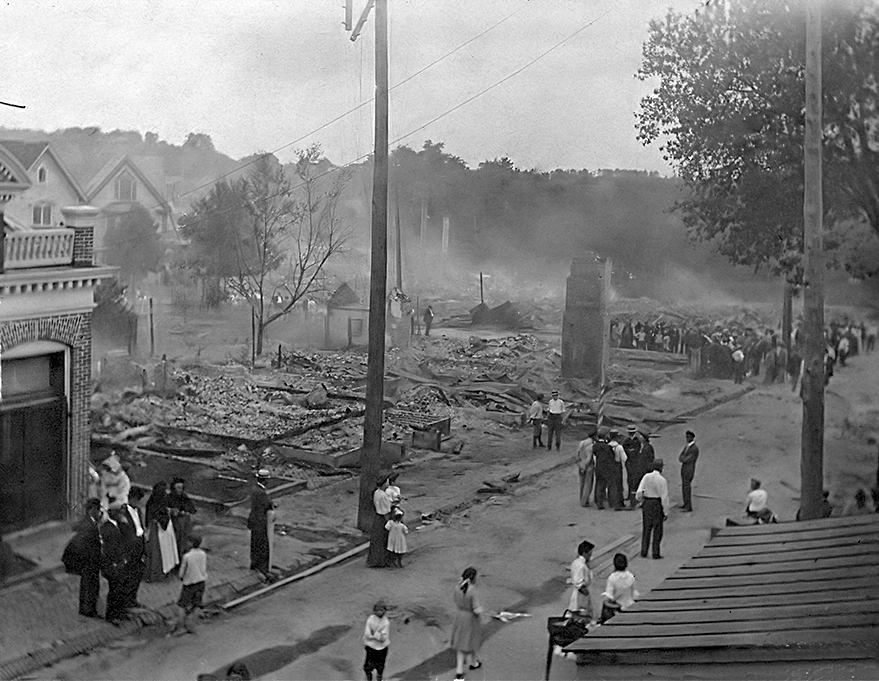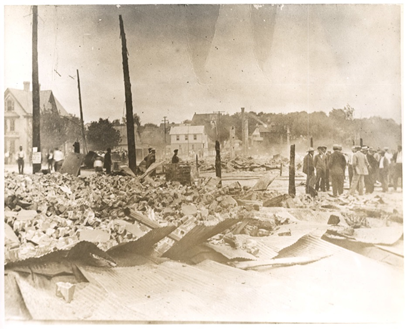The most disastrous conflagration that ever visited Milton occurred on Friday morning the 12th and has destroyed the whole of the business portion of the town. The fire was discovered by Wesley Coverdale, night watchman at the Royal Packing Company works. This was about one o’clock, and the fire was inside the back part of the “big store” corner Federal and Front streets. The alarm was given and the fire engine was gotten out and citizens gathered from all quarters to fight the flames. It soon became apparent that it was going to be a big fire, as everything was dry and the flames gained rapidly and began to extend to other buildings. The post office was soon on fire. C. A. Conner’s store and the whole of lower Front Street into Union and to the bridge all was wiped out. When the “big store” fell S. J. Wilson & Son’s undertaking and furniture store caught and nothing could be done to save the whole lower part of the town. Help was phoned for to Milford, Lewes and Georgetown. At 5 o’clock the Lewes fire company and many other citizens arrived on a special train; but the fire was under control. This company has efficient workers and did good service on putting out the smoldering remains; pulling down the brick wall of the Ponder Hotel, telephone poles and removing other dangerous obstructions. At six o’clock a mass of ruins marked the spot where a few hours before thousands of dollars’ worth were congregated.

The buildings burned are as follows: The “big store,” corner of Federal and Front streets, occupied by Marvel & Hartman, W. T. Starkey’s drug store, and Mason & Davidson general merchandise, post office with its contents, C. A. Conner’s store, Black & Lingo, C. A. Conner’s second store, Carey & Darby, Joseph Walls meat store, W. Stephen’s wheelwright shop, William Maull’s blacksmith shop, Mrs. Mary Fields’ confectionary and ice cream parlor. Here the fire was stopped by the river. S. J. Wilson & Son’s undertaking and furniture store, northeast corner Federal and Front streets. The Ponder Block, owned by James Palmer, and occupied by his family, James Clendaniel’s meat store, William Warren’s pool room, and the justice of the peace’s office. The National Bank south west corner of Federal and Front streets, – money was saved – the central telephone office, William Mears barber shop and dwelling house.


Here the flames ran against the S. T. T. & S. D. Co., which building being of brick with metal entablature and finish arrested it fiery tongues. At sunrise a scene of desolation hung over and around the business portion of our pretty town. The telephone poles were lying across the streets, where they had been cut and fallen, and the wires together with the electric wires, were a mass that made navigation along the streets perilous. Most of the day on Friday the fire hose played on the smoldering fire which was by no means extinguished. The hose threw a forceful stream; it being attached to the stream pump of the steamer Maria Thomas. This burned district was roped off but a crowd was loitering around all day. Many of them being persons from contiguous towns, drawn hither by curiosity. The telephone and electric light companies had their employees on the ground, gathering up the twisted wires; and the phone company delivered a load of new material on this day to replace the old which was unfit to use again. We had forgotten to mention the Georgetown hook and ladder company which came over, and many other Georgetown citizens amongst them, the Mayor, all of whom did efficient service. The Mayor of Milton, in the name of the town, extends thanks to the Georgetown friends, the Lewes friends, and last, but by no means least, to the Volunteer Fire Company of Milton, for their indefatigable labors, which has merited them laurels at this, the time of Milton’s terrible disaster. If the men did their duty, what of the women? They, who would on a common occasion get frightened at a mouse dropped, for the moment, the epithet of “lady” and assumed the role of the “heroine,” and with hands blackened and faces begrimed, worked with zest and zeal, in removing goods, carrying water, and lending a hand to anything that needed. We are not writing this account sentimentally, nor for rhetorical effect, but relating the stern logic of facts.[i]
By herculean efforts the residences of C. A. Conner, Mrs. Hazzard and the store of William Warren, on the west side of Union street, were saved though slightly on fire, several times. The upper part of Federal Street and the eastern part of Front Street on Friday morning presented a quaint scene of loaded vehicles, carriages and other running gear, all ready for a further move, should it have been necessary. The disaster is great. The damage being estimated to at least $100,000[ii]. But great as it is, had not the night been comparatively calm, it would have been greater.
Most of the property and goods were insured for a nominal amount, a few saved part of their effects. Four families were made homeless but are fortunate in having found vacant homes and moved therein. James Palmer and family have moved to the farm of W. W. Conwell, near town; Mrs. Mary Field has gone to the Eli B. Carey property in the suburb of town; and William Mears occupies a property of Captain Hunter on Atlantic Street.
The merchants have already secured what vacant places were around and will soon have a stock of goods and try to retrieve, in part, what they have lost. C. A. Conner has temporarily rented C. H. Atkins’ vacant storehouse corner Front and Chestnut Streets, Carey & Darby have secured the Davis Carey storehouse[iii] Cor. Union and Broad Streets North Milton. William Mears has removed his tonsorial business into the Lofland storehouse on Federal Street. James Clendaniel has opened a meat store in the Milton Engine House. Joseph Walls takes his meat store to the corner of Federal and Mulberry Streets, a place which, fortunately for him, he had under rent fort the year. O, it is a cramped up time but the men are doing all they can.
It is reasonable to predict some of these building sites will be built on again, and it is just as reasonable to predict some of them will not, for a long time, or as long as the land be held by its present owners.
Postmaster Black has opened another post office corner Chestnut and Wharton streets, South Milton; and by the way Mr. Black was hurt during the fire. He was burned badly on the face.
Joshua Gray, who occupied a part of the building with the National Bank, has moved into a property of Captain Frank Lacey on Federal Street.
Telephone communications with the outside world were re-established on Saturday; an outbuilding back of the S. S. T. F. & D. Co., being improvised for a central office.
The electric lights were rehabilitated the early part of the week, and the general […] of town affairs have resumed their wonted role.
There appears to be a fatality attending the store built upon the corner, where this fire occurred. About twenty years ago. On a Sunday afternoon a can of powder exploded in the store then there, shattering the large front plate windows to “smithereens”: and on the morning of Dec. 30th, 1890, the same building was burned to the ground, under mysterious circumstances.
Regarding the unfortunate disaster to Milton, the Wilmington and Philadelphia papers have maintained their time-honored reputation for lying.[iv] One of the biggest lies of the week was published in the Wilmington Evening Journal of this [….]. The writer of that communication knows nothing about the […….remainder of column illegible].
The Camp meeting at Lavinia Wood commenced on Sunday. This together with the terribly exaggerated reports of the city papers brought many from the cities, who were native of or had friends in Milton. It is said one young man, who has a mother living here, started at first hearing the news without redressing, and brought with him enough bandages to supply the Philadelphia hospital. There were others; one lady in particular, who came home under a similar nervous strain; all of which goes to show the evil these unprincipled sensational writers are doing.
On Sunday Hotel Jester had 63 for dinner, and 45 passengers left on the D. M. & V. R. R. on Monday morning, who had been Milton visitors.
A good rain on Sunday night, and Monday morning has nearly extinguished the fire, though in many places under the debris, it appears on the slightest raise in the wind.
The guards that were put around the burned district by Major Jones, at the first as yet—one set in the day; and another at night—and will continue until the representatives of the insurance companies arrive and adjust the claims which will probably be today (Wednesday).
Addenda: It is understood that Black & Lingo have rented the unoccupied store house of Dr. R. T. Wilson, in North Milton, and that Mason & Davidson will occupy the small dwelling of James Palmer, near the burnt district on Federal Street. S. J. Wilson & Son will conduct their undertaking business at his residence, on Mill Street; and W. W. Conwell has reopened the National Banking business in apart of H. P. Burton’s store on Federal Street.
———————————
[i] These last three sentences are one of the very few times, if not the only time, that Conner lauds the women of Milton as a group for efforts normally reserved to males.
[ii] About $2.6 million in today’s dollars
[iii] The Davis Carey storehouse still stands, and is the oldest continuously operating commercial building in Sussex County. It operates today as the King Ice Cream parlor.
[iv] Many newspapers of the day reported Milton to have been completely destroyed by the fire and hundreds left homeless, a gross exaggeration given the facts but not unusual for journalism at that time. Among the newspapers that reported the event, the New York Times and the Harrisburg Telegraph were closest to the facts. The latter journal, however, could not resist a little hint of sensationalism, reporting the following: “Careful inquiry leads to the suspicion of incendiarism as to the cause of the fire. The town night watchman says he passed the Markel & Hartman store where the fire started, sometime after midnight, and saw the electric lights burning as usual, with no indications of anything wrong. Within a half hour the blaze was discovered.” Note: the Markel & Hartman store was known to locals as the “Big Store.”

